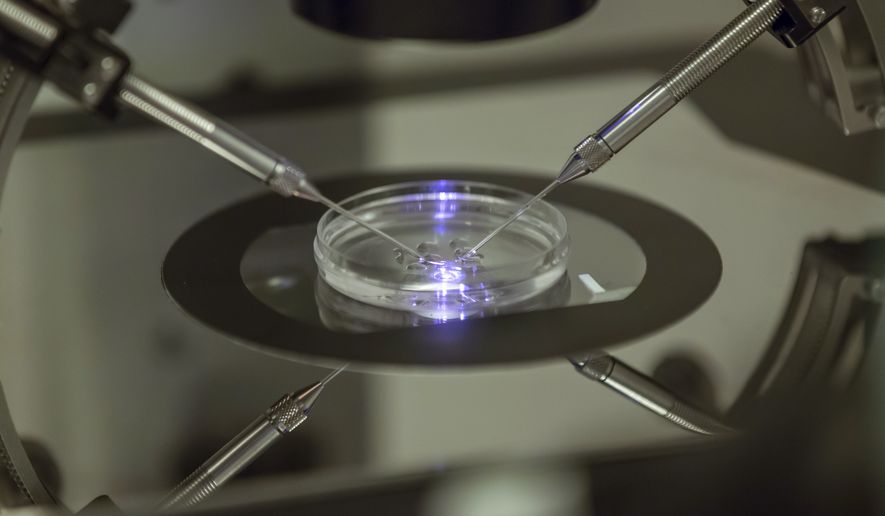Advocates plan to lobby for the reproductive health rights for surrogate mothers in New York, where surrogacy remains illegal even after Democrats enacted several pro-choice laws this year.
Couples who seek a surrogate can start the process in New York, but they must rely on agencies to connect with women in states where surrogacy is legal, says Dr. Briana J. Rudick, fertility specialist at Columbia University Fertility Center. The couples are often same-sex or they are different-sex and have fertility issues.
“There is legal risk,” Dr. Rudick told The Washington Times. “New York has fallen so far behind other states.”
More than a dozen states have legalized surrogacy, but New York is one of five that bans it. Feminist critics have registered strong objections to surrogacy, which they say commercializes women’s bodies.
The New York State Assembly and Senate had a busy legislative session on women’s health care, lifting restrictions on late-term abortions and removing the termination of pregnancies from the criminal code.
But liberal detractors, including feminist Gloria Steinem, helped stall momentum on a surrogacy bill that had passed the Senate and won Democratic Gov. Andrew Cuomo’s support.
A few days before the session ended in June, Assembly Speaker Carl Heastie, a Bronx Democrat, announced he would not introduce the surrogacy bill due to a lack of support in the Democratic caucus.
Assemblywoman Deborah Glick, who became the first openly gay legislator in New York in 1991, told The New York Times that legalizing surrogacy is “a problem for the extraordinarily well-heeled.”
“People are afraid to talk about it because it shouldn’t be overly commercialized and we respect the feminist perspective,” Dr. Rudick said.
There are two types of surrogacy. Gestational surrogacy occurs when an egg from the intended mother is fertilized by sperm to produce an embryo that is implanted into the surrogate mother. The surrogate shares none of her genetic material with the embryo.
In traditional surrogacy, the surrogate is artificially inseminated with the father’s sperm and, therefore, is genetically related to the embryo. Many states outlaw traditional surrogacy, citing complicated familial relations in a business transaction.
According to BabyCenter, surrogacy can cost parents $150,000, including $22,000 for the agency fee and between $25,000 and $35,000 for the surrogate mother.
Surrogacy resembles, in the words of some observers, something like “The Handmaid’s Tale,” with wealthy couples using poor women to bring babies to term babies, which the birth mothers will never see again.
There are conservative objections, as well. Focus on the Family points to legal concerns with surrogacy when parents separate, leaving child support to the surrogate. In vitro fertilization often produces multiple embryos, which can prompt “selective abortion” decisions, pro-life critics say.
Also, the Commission on Parenthood’s Future issued a 2010 survey in which 46% of respondents were bothered by the fact that their conception involved an exchange of money. The campaign to legalize surrogacy in New York faces a hurdle in the state Assembly.
“I look forward to continuing this conversation in the coming months with our members and interested parties to develop a solution that works for everyone,” Mr. Heastie said in a statement.
The bill’s fate may rest on an intraparty debate among Democrats on what feminism means.
“As one younger woman said to me, we either have to decide that women have control of their bodies or we don’t,” Assemblywoman Amy Paulin, a surrogacy supporter, told Jezebel.com last week. “But we should be consistent. So that’s what the younger women believe, but the older women didn’t.”
• Christopher Vondracek can be reached at cvondracek@washingtontimes.com.




Please read our comment policy before commenting.